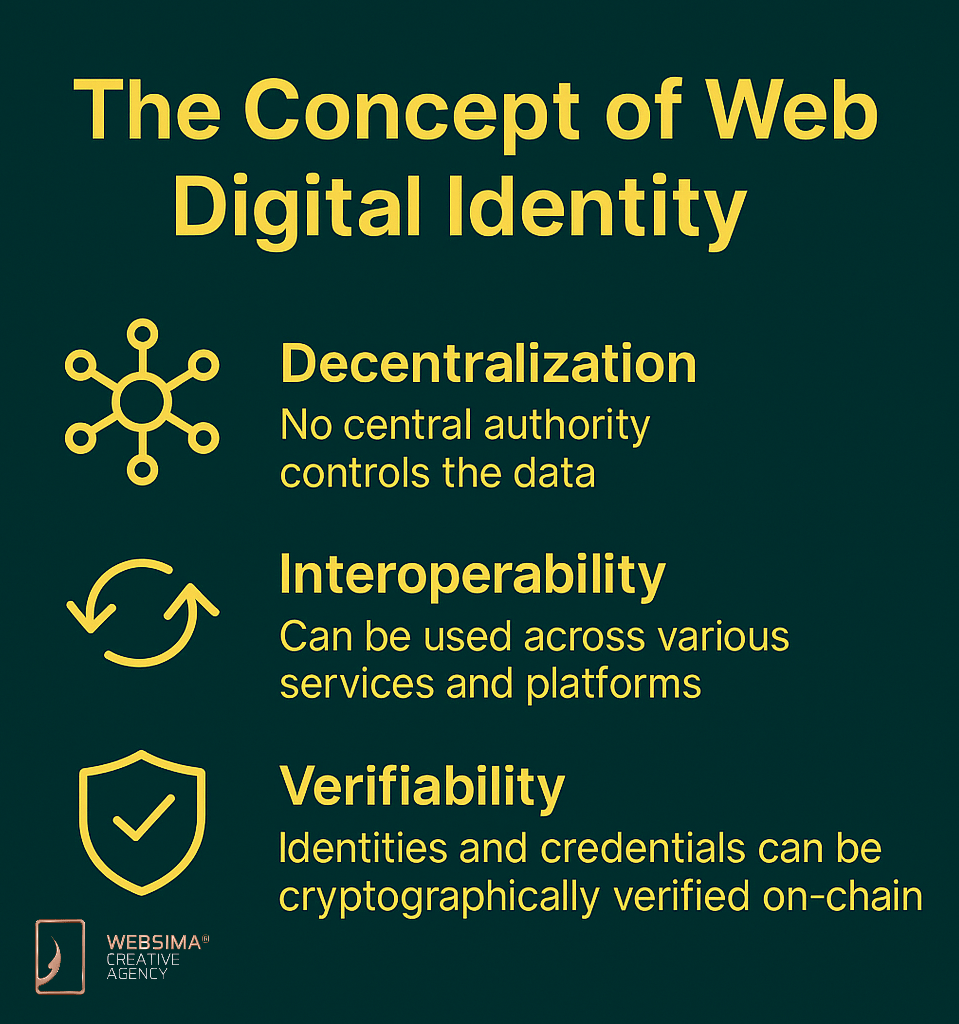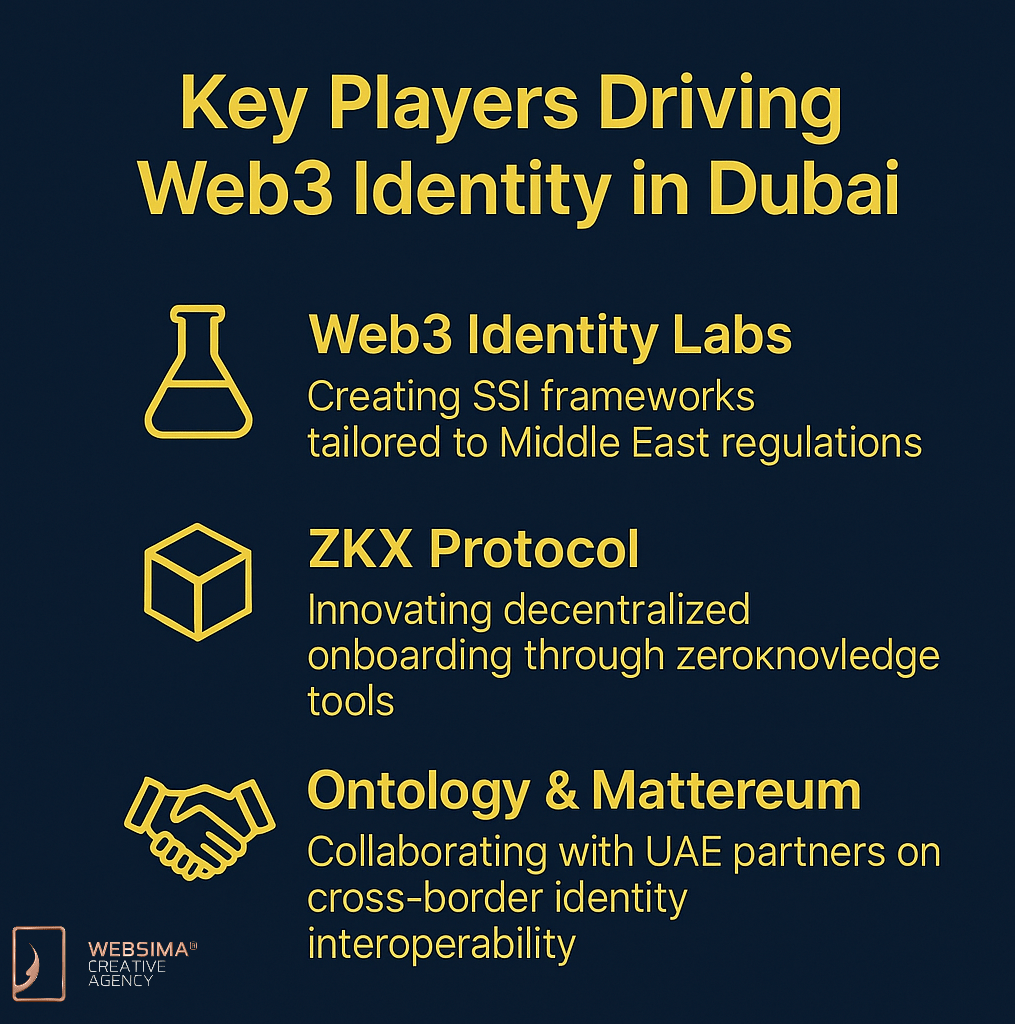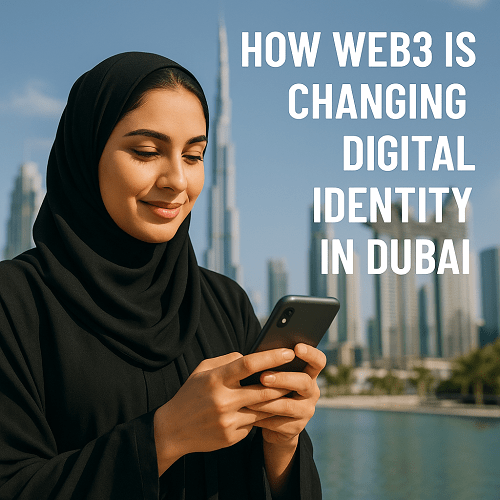Table of Contents
- Introduction: Dubai’s Push Toward Digital Identity
- The Concept of Web3 Digital Identity
- Self-Sovereign Identity (SSI): Power to the Individual
- Blockchain Passports and Their Use Cases in Dubai
- Privacy Enhancements Through Decentralization
- Integration with Government Services in Dubai
- Key Players Driving Web3 Identity in Dubai
- Legal and Regulatory Framework in the UAE
- Use Cases Across Industries
- Challenges and Limitations of Web3 Identity
- The Future Outlook for Digital Identity in Dubai
- Conclusion: Reimagining Identity in a Web3 World
- FAQs
- Get Expert Web3 Support in Dubai – Contact Websima
Introduction: Dubai’s Push Toward Digital Identity
Dubai is leading global adoption of Web3 by continuing to position itself as a global innovation hub by adopting technologies that redefine the way governments and citizens interact. One such area of rapid transformation is digital identity, now entering a new era powered by Web3. As centralized systems give way to decentralized models, the city is embracing blockchain-based solutions for more secure, private, and user-controlled identity systems.
With the implementation of self-sovereign identity (SSI), blockchain passports, and decentralized verification methods, Web3 digital identity in Dubai is not only becoming a reality — it’s setting a precedent for cities around the world.
In my view, one of the most pragmatic and well-structured approaches to digital identity in Web3 right now is coming from my friends – @Xiiid_official.
What stands out to me is how they integrate various layers of identity – from DID-based wallets to AI-generated profiles and… pic.twitter.com/wVWDDblyef
— Paweł Łaskarzewski Dubai, Token2049 (@PawelSynapse) June 5, 2025
The Concept of Web3 Digital Identity

Web3 digital identity refers to decentralized, blockchain-based identification systems that give individuals full control over their personal data. These systems allow users to manage their identity without relying on centralized authorities like governments or corporations.
Key attributes include:
- Decentralization: No central authority controls the data.
- Interoperability: Can be used across various services and platforms.
- Verifiability: Identities and credentials can be cryptographically verified on-chain.
This shift allows users to authenticate themselves with minimal data exposure — a significant step toward greater privacy and data security.
Self-Sovereign Identity (SSI): Power to the Individual
Self-sovereign identity is a core pillar of Web3 identity systems. In an SSI framework, users store their identity credentials in secure digital wallets and share them only when necessary.
Benefits of SSI for Dubai residents and organizations include:
- Full ownership of identity data
- Fraud-resistant verifiable credentials
- Reduced reliance on paper-based processes
Dubai’s government-backed innovation bodies, including the Dubai Future Foundation, are already exploring how SSI can be implemented in public services and smart city frameworks.
Blockchain Passports and Their Use Cases in Dubai
While traditional passports remain the global standard for travel, blockchain-based passports are emerging in Dubai as secure alternatives for digital identity within specific jurisdictions and use cases.
Examples of blockchain passport applications in Dubai:
- Verifying business licenses and company founders in free zones
- E-residency programs for remote workers
- Authenticating participants in blockchain and crypto regulatory frameworks
Though not a replacement for national passports, these credentials provide verifiable, real-time identity solutions for government and business platforms.
Privacy Enhancements Through Decentralization
Web3 identity models significantly enhance user privacy. Unlike traditional databases vulnerable to breaches, decentralized identity systems ensure that sensitive information remains under the user’s control.
Privacy tools enabled by Web3:
- Zero-knowledge proofs (ZKPs) for verifying attributes without revealing data
- Selective disclosure of personal details
- No centralized honeypots, which are frequent targets for cyberattacks
These tools are critical for aligning with international data protection regulations while also securing UAE-based services.
Integration with Government Services in Dubai
Dubai is gradually integrating Web3 identity frameworks into its digital public services. The UAE Pass — already used for accessing over 6,000 federal and local services — is laying the groundwork for blockchain-based extensions.
Anticipated developments:
- Web3-compatible e-signatures for contracts
- Blockchain-based medical identity for health records
- Unified SSI wallet integration with smart city infrastructure
Such efforts are supported by Dubai’s overarching Blockchain Strategy and Smart Dubai 2021 initiatives, which aim to migrate public transactions to blockchain systems.
Key Players Driving Web3 Identity in Dubai

Several key organizations and startups are actively contributing to Dubai’s Web3 identity ecosystem:
- Web3 Identity Labs: Creating SSI frameworks tailored to Middle East regulations
- ZKX Protocol: Innovating decentralized onboarding through zero-knowledge tools
- Ontology & Mattereum: Collaborating with UAE partners on cross-border identity interoperability
In addition, Web3-focused incubators like Crypto Oasis and accelerators within DIFC and DMCC free zones are fueling growth in identity-based blockchain startups.
Legal and Regulatory Framework in the UAE
Although the UAE does not yet have a specific legal framework for Web3 identity systems, several regulatory guidelines support the shift toward decentralization:
- UAE Federal Data Protection Law (No. 45 of 2021) enshrines user control over personal data
- VARA and ADGM guidelines require robust user verification methods for blockchain-based businesses
- Cross-border data governance initiatives in partnership with OECD and UNDP enhance international trust
Policymakers are currently evaluating ways to formally integrate SSI and blockchain identity into national legal frameworks that all Web3 companies and crypto licensing must be aware of.
Use Cases Across Industries
Real Estate
Investors can use verified Web3 identities to complete digital KYC for fractional property ownership.
Education
Dubai universities can issue blockchain-verified diplomas to prevent forgery.
Healthcare
Patients manage their own health records with granular control over who sees what.
Finance
Web3 wallets support compliant onboarding to DeFi platforms and virtual banks.
Tourism & Events
Visitors can hold temporary digital passes for access to venues and experiences.
These examples highlight how Web3 digital identity is not limited to one sector but offers a foundational layer for all digital interactions in Dubai.
Challenges and Limitations of Web3 Identity
Despite the advantages, Web3 identity adoption faces several real-world challenges:
- Lack of public awareness or digital literacy among residents
- Security risks if private keys are lost or stolen
- Absence of global standards, leading to siloed ecosystems
- Legal uncertainty around recognition of blockchain credentials in international contexts
Addressing these issues will require continuous collaboration between Dubai authorities, developers, and international regulators.
The Future Outlook for Digital Identity in Dubai
Dubai is on track to become a global leader in Web3 identity. Over the next decade, we can expect:
- National deployment of decentralized identity systems
- Government and enterprise adoption of verifiable credentials
- Web3-based voting systems in civic platforms
- Full interoperability between public and private sector services using SSI
As the city builds on its blockchain infrastructure, its digital identity framework will grow more secure, user-centric, and future-ready.
Conclusion: Reimagining Identity in a Web3 World
The evolution of digital identity in Dubai through Web3 marks a foundational change — from control by central authorities to empowerment of the individual. With self-sovereign identity, blockchain passports, and decentralized data protection tools, Dubai is setting a model for how identity should work in a modern, privacy-respecting society.
Web3 digital identity in Dubai is not a distant vision. It is an unfolding reality — one that promises greater efficiency, safety, and control in how people and businesses authenticate and engage in digital environments.
FAQs
What is Web3 digital identity?
Web3 identity is a decentralized system where users control and manage their credentials through blockchain rather than relying on centralized databases.
Is Dubai adopting self-sovereign identity?
Yes, Dubai is actively exploring SSI models in both public and private sectors as part of its blockchain transformation initiatives.
What are blockchain passports used for in Dubai?
They serve as verifiable credentials for e-residency, business verification, and digital onboarding — not for international travel.
How is user privacy protected in Web3 identity?
Through zero-knowledge proofs, encryption, and selective disclosure, users maintain control over what data is shared and with whom.
Are Web3 identities compatible with UAE Pass?
Currently, UAE Pass is a centralized digital ID, but future upgrades may incorporate decentralized verification models.
Get Expert Web3 Support in Dubai – Contact Websima
Navigating Web3 identity systems, smart contract integrations, and decentralized infrastructures in Dubai requires both strategic and technical expertise. At Websima, we provide comprehensive support for businesses and startups looking to build next-generation digital identity platforms — from ideation and architecture to compliance and deployment.
Whether you’re a government entity planning blockchain identity integration, a fintech startup building SSI wallets, or a real estate platform needing verifiable credentials — we’re here to guide you.
Connect with Websima today to begin shaping the future of digital identity in Dubai.





